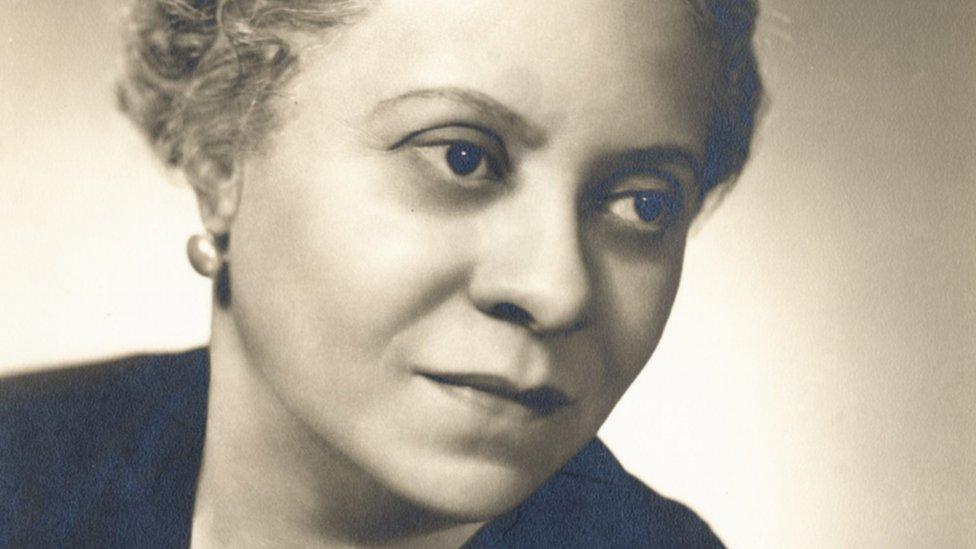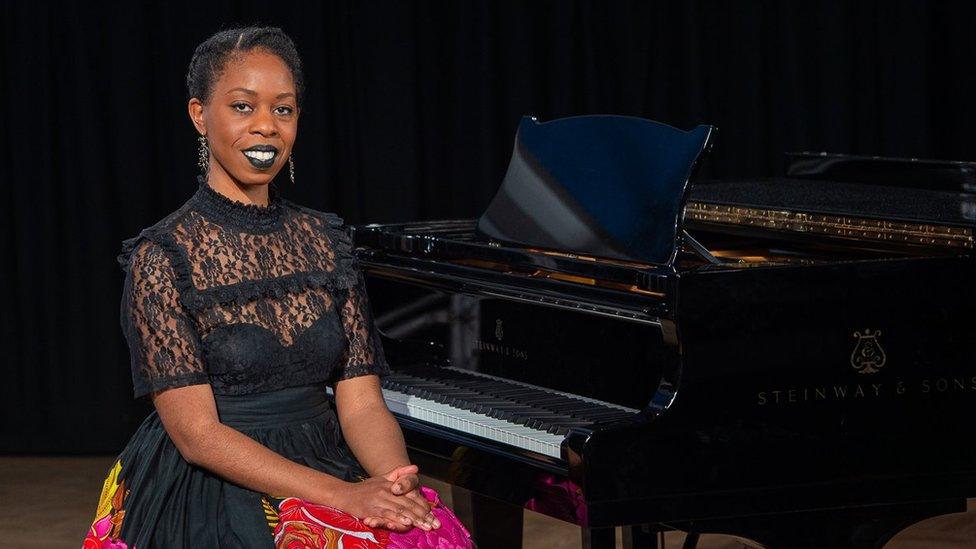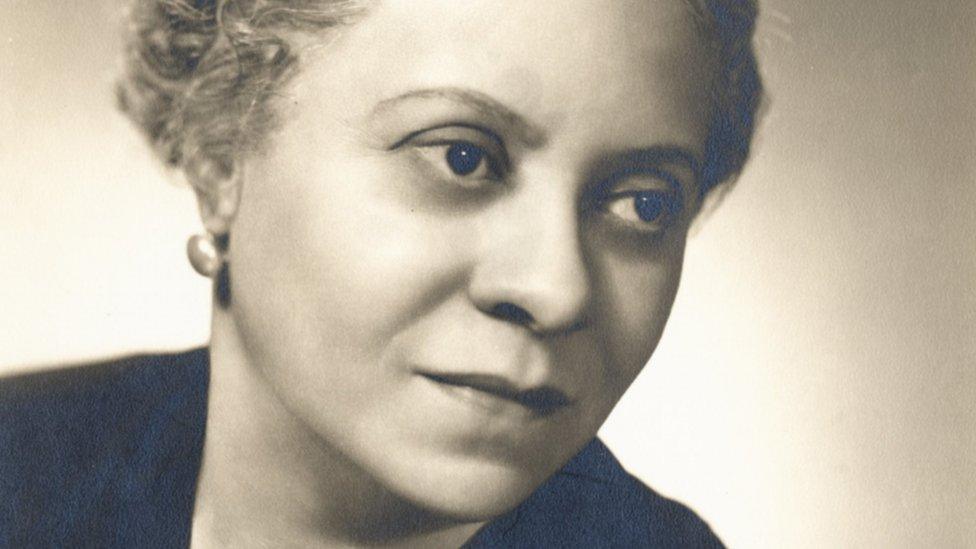Florence Price: Forgotten work by pioneering composer rediscovered
- Published

Florence Price's music has been brought to wider audiences in recent years
A forgotten work by the pioneering composer Florence Price has been rediscovered and performed for the first time in nearly 80 years.
Price made history in 1933 when she became the first African-American woman to have a symphony performed by a major US orchestra, in Chicago.
But her work faded into obscurity after her death in 1953.
Much of it was thought to be lost, until a cache of music was found in her former summer house in Chicago in 2009.
Musicologist Samantha Ege has spent the past two years trawling through those archives to reconstruct her solo piano pieces. Among them was Fantasie Nègre No 3 in F Minor, which was long presumed to be incomplete.
'Gathering dust'
"The music just ended after two pages really abruptly," Ege told the BBC. She made it her mission to find the missing pieces in Price's archive, which is now held in the University of Arkansas.
The problem was that, while the piece starts in F minor, the second page ends in a different key - A♭ major.
Using Price's previous compositions as a template, Ege assumed the Fantasie would return to the original key in its closing passages.
"I tried to imagine where the music could go," she said. "But I didn't have a piano [in the archives] so I was really just trying to work it all out in my head."
The eureka moment came when Ege realised Price "had more to say" in the second key of A♭ major.
She quickly found pages of manuscript that seemed match the first two sheets of Fantasie Nègre No 3 just "gathering dust" in a box on a shelf.
She wasn't convinced of her breakthrough until she went home and tried the piece out on her piano.
"When I was playing through the music and it was under my fingers it just felt magical. It felt that history was coming to life," she told BBC arts correspondent Rebecca Jones.
"I sort of had chills thinking about the fact that I am hearing this music for the first time in this century."
Ege subsequently recorded the piece - the first time it has been committed to tape - for a new CD, Fantasie Nègre - The Piano Music of Florence Price.
Allow YouTube content?
This article contains content provided by Google YouTube. We ask for your permission before anything is loaded, as they may be using cookies and other technologies. You may want to read Google’s cookie policy, external and privacy policy, external before accepting. To view this content choose ‘accept and continue’.
It was released on Monday, International Women's Day, alongside recordings of Price's other Fantasies and various "sketches and snapshots" that Ege found in the archive.
"Each one takes various ideas from a black folkloric musical tradition and blends [them] with the late 19th Century Romantic tradition," she said. "The first Fantasy Nègre is based on a spiritual, Please Don't Let This Harvest Pass... and I think of each one as different chapters in a very elaborate novel.
"Even though they were never published during her lifetime, she wrote them down and noted that they were some of her most worthy compositions, and so it's really moving to be able to bring that together and perform them together."
Composer's story
Ege's work is the latest chapter in the rediscovery and reappraisal of Price's work.
She was born Florence Smith in 1887 in Little Rock, Arkansas, to a dentist father and piano teacher mother, who encouraged her to take up the instrument.
She went on to study at the New England Conservatory of Music, one of the few music schools to accept black students at the time, and earned two diplomas in piano and organ. By 1910, she was head of the music department at Clark Atlanta University in Atlanta, Georgia.
In 1912, she married Thomas J Price and they moved back to her home town - but racial tensions were on the rise and, after a public lynching in 1927, the family moved to Chicago.
When her husband struggled to find work, the couple divorced, but Price retained her married name and made ends meet by teaching piano, playing the organ for silent film screenings and writing advertising jingles under the name Vee Jay.
At the same time, she started entering composing competitions, winning several prizes. Her big break came in 1932, when her First Symphony won the orchestral category in the Wanamaker Music Composition Contest. That caught the attention of conductor Frederick Stock, who premiered the symphony with the Chicago Symphony Orchestra the following year.
Despite that success, she often struggled to get her music played in a more sexist and segregated era. It was a problem she acknowledged in a 1943 letter to the music director of the Boston Symphony Orchestra, Serge Koussevitzky, asking him to consider performing her music.
"I have two handicaps," she wrote. "I am a woman and I have some Negro blood in my veins."
She continued to write, and her music was performed in concert halls in Detroit, Michigan, and Brooklyn, New York.
The contralto Marian Anderson also sang Price's arrangement of My Soul's Been Anchored in De Lord as the closing song of her historic concert at the Lincoln Memorial in Washington DC in 1939.

Samantha Ege wants Price's music to be heard and preserved for future generations
After her death in 1953, Price's music was largely overlooked by the classical music establishment, but her reputation was preserved by black musicians and newspapers, which championed her legacy.
The discovery of her archive in 2009 helped bring her music to wider audiences again, with BBC Radio 3 dedicating a five-part documentary to her story last year.
Ege said there were many more works in Price's repertoire that remain to be recorded and publicised - and with the first festival dedicated to the composer due to take place later this year, she hopes her place in the classical music canon will be maintained.
"These pieces now need to be performed, and we need to hear them, so that we can we can appreciate Florence Price today, not just in terms of her history, but in terms of the works and the artistry that she created," she said.

Follow us on Facebook, external, or on Twitter @BBCNewsEnts, external. If you have a story suggestion email entertainment.news@bbc.co.uk, external.
Related topics
- Published8 March 2017
